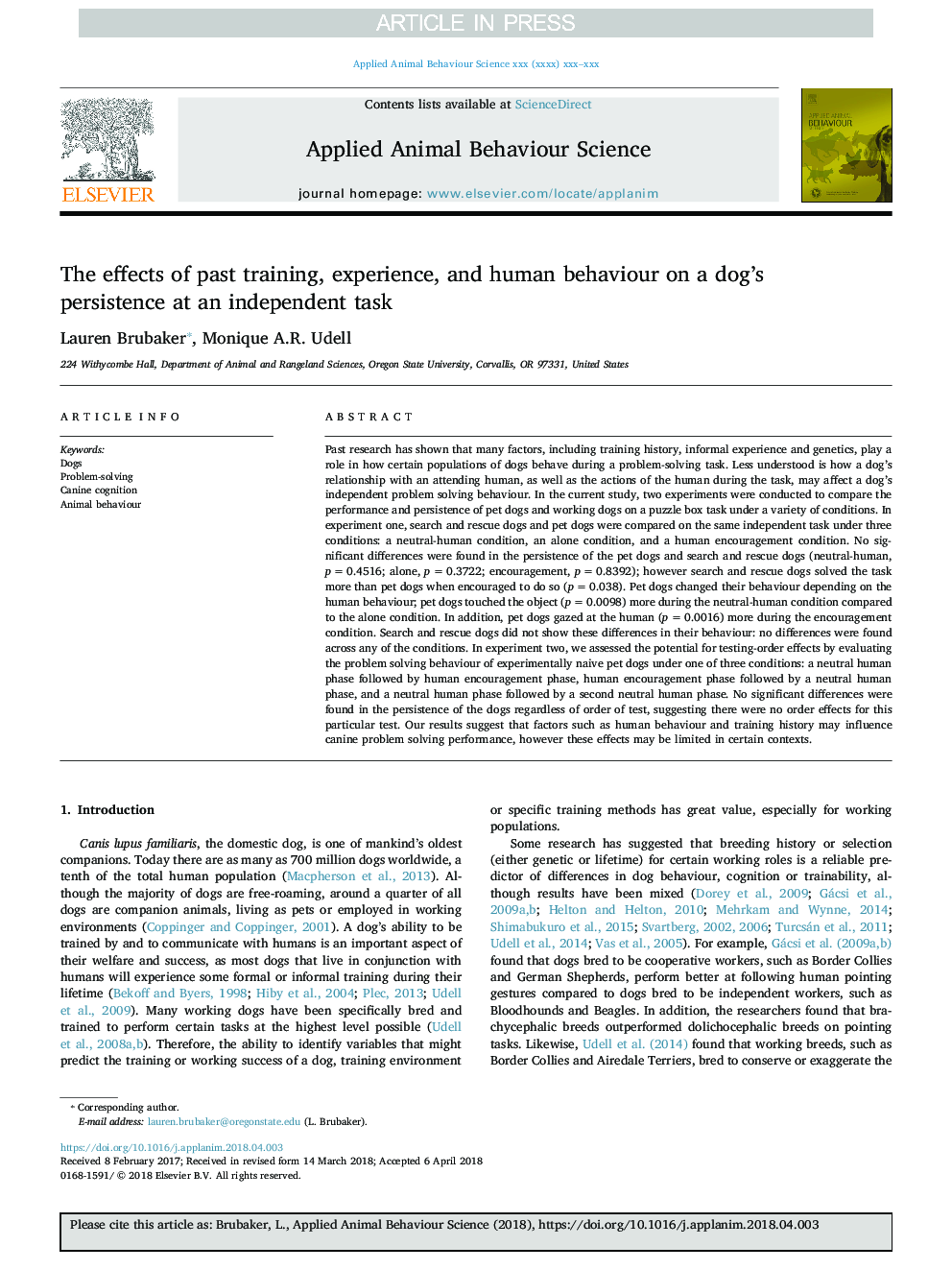| کد مقاله | کد نشریه | سال انتشار | مقاله انگلیسی | نسخه تمام متن |
|---|---|---|---|---|
| 8882759 | 1625302 | 2018 | 7 صفحه PDF | دانلود رایگان |
عنوان انگلیسی مقاله ISI
The effects of past training, experience, and human behaviour on a dog's persistence at an independent task
ترجمه فارسی عنوان
اثرات آموزش گذشته، تجربه و رفتار انسانی بر پایداری سگ در یک کار
دانلود مقاله + سفارش ترجمه
دانلود مقاله ISI انگلیسی
رایگان برای ایرانیان
کلمات کلیدی
سگ ها، حل مسئله، شناخت سگ، رفتار حیوانات،
موضوعات مرتبط
علوم زیستی و بیوفناوری
علوم کشاورزی و بیولوژیک
علوم دامی و جانورشناسی
چکیده انگلیسی
Past research has shown that many factors, including training history, informal experience and genetics, play a role in how certain populations of dogs behave during a problem-solving task. Less understood is how a dog's relationship with an attending human, as well as the actions of the human during the task, may affect a dog's independent problem solving behaviour. In the current study, two experiments were conducted to compare the performance and persistence of pet dogs and working dogs on a puzzle box task under a variety of conditions. In experiment one, search and rescue dogs and pet dogs were compared on the same independent task under three conditions: a neutral-human condition, an alone condition, and a human encouragement condition. No significant differences were found in the persistence of the pet dogs and search and rescue dogs (neutral-human, pâ¯=â¯0.4516; alone, pâ¯=â¯0.3722; encouragement, pâ¯=â¯0.8392); however search and rescue dogs solved the task more than pet dogs when encouraged to do so (pâ¯=â¯0.038). Pet dogs changed their behaviour depending on the human behaviour; pet dogs touched the object (pâ¯=â¯0.0098) more during the neutral-human condition compared to the alone condition. In addition, pet dogs gazed at the human (pâ¯=â¯0.0016) more during the encouragement condition. Search and rescue dogs did not show these differences in their behaviour: no differences were found across any of the conditions. In experiment two, we assessed the potential for testing-order effects by evaluating the problem solving behaviour of experimentally naive pet dogs under one of three conditions: a neutral human phase followed by human encouragement phase, human encouragement phase followed by a neutral human phase, and a neutral human phase followed by a second neutral human phase. No significant differences were found in the persistence of the dogs regardless of order of test, suggesting there were no order effects for this particular test. Our results suggest that factors such as human behaviour and training history may influence canine problem solving performance, however these effects may be limited in certain contexts.
ناشر
Database: Elsevier - ScienceDirect (ساینس دایرکت)
Journal: Applied Animal Behaviour Science - Volume 204, July 2018, Pages 101-107
Journal: Applied Animal Behaviour Science - Volume 204, July 2018, Pages 101-107
نویسندگان
Lauren Brubaker, Monique A.R. Udell,
